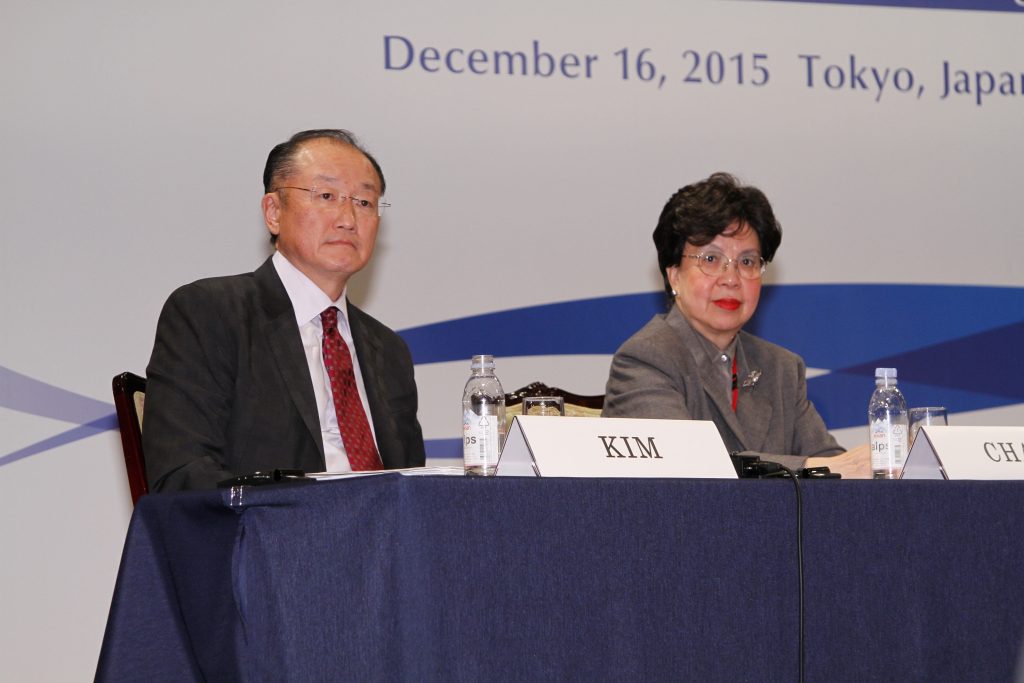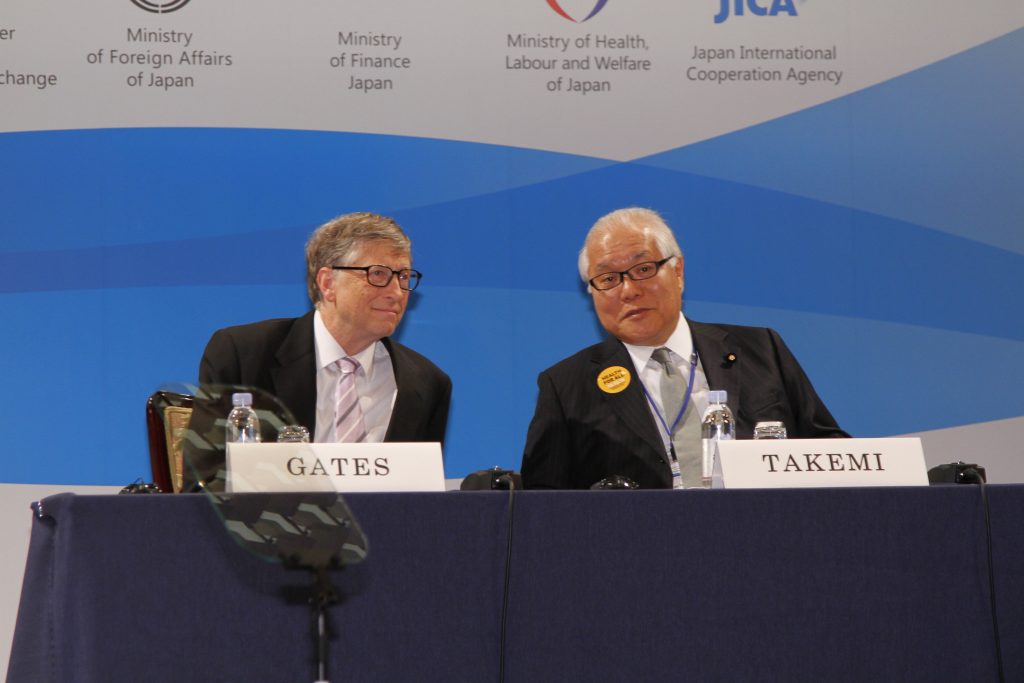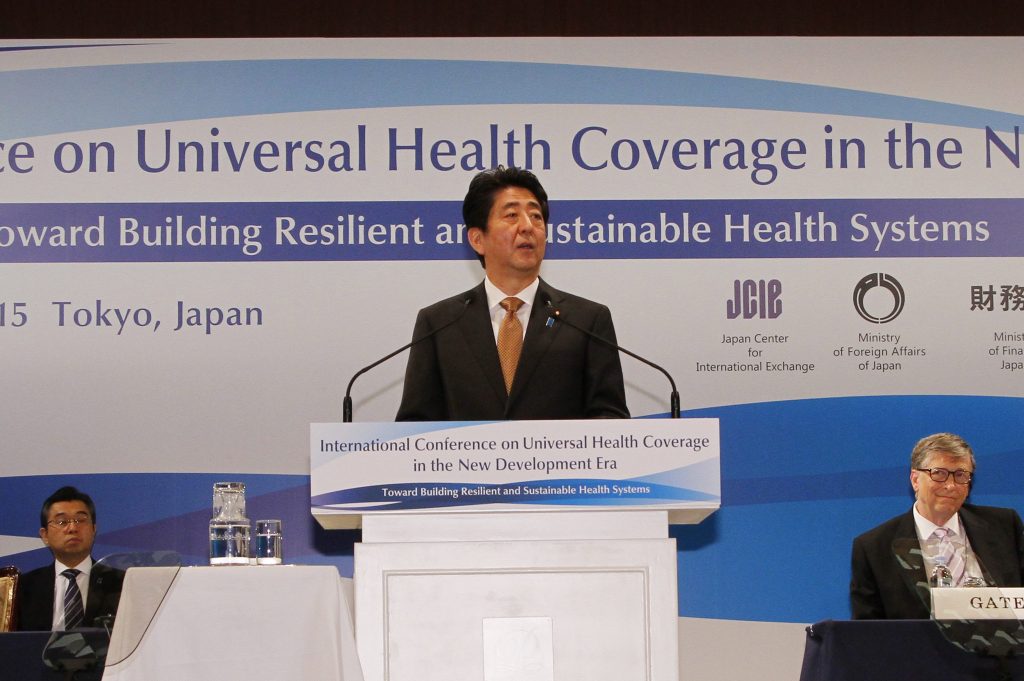On December 16, 2015, approximately 300 leaders from around the globe—political leaders, heads of international organizations, NGO leaders, scholars, and other experts in the fields of global health and development—converged in Tokyo for a major conference on the topic of universal health coverage (UHC). The meeting, which was co-organized by JCIE and the government of Japan, came at a key moment in history: It represented the first major international meeting on global health following the adoption of the 2030 Agenda for Sustainable Development at the UN General Assembly in September of this year, marking a shift in the world’s development agenda from the Millennium Development Goals (MDGs) to the Sustainable Development Goals (SDGs).
The timing of the conference was also important in that Japan will assume the presidency of the G7 next year, with the G7 Ise-Shima Summit and the G7 Kobe Health Ministers’ Meeting scheduled to take place in Japan in May and September respectively. In addition, the 6th Tokyo International Conference on African Development (TICAD VI) will be held in Africa for the first time in 2016. Given its own success in having achieved UHC in 1961, while still in the early stages of its postwar development, Japan can provide lessons in implementing and sustaining UHC in the new development agenda and in enhancing the resilience of health systems and communities around the world.
CONFERENCE REMARKS



On December 16, 2015, approximately 300 leaders from around the globe—political leaders, heads of international organizations, NGO leaders, scholars, and other experts in the fields of global health and development—converged in Tokyo for a major conference on the topic of universal health coverage (UHC). The meeting, which was co-organized by JCIE and the government of Japan, came at a key moment in history: It represented the first major international meeting on global health following the adoption of the 2030 Agenda for Sustainable Development at the UN General Assembly in September of this year, marking a shift in the world’s development agenda from the Millennium Development Goals (MDGs) to the Sustainable Development Goals (SDGs). The timing of the conference was also important in that Japan will assume the presidency of the G7 next year, with the G7 Ise-Shima Summit and the G7 Kobe Health Ministers’ Meeting scheduled to take place in Japan in May and September respectively. In addition, the 6th Tokyo International Conference on African Development (TICAD VI) will be held in Africa for the first time in 2016.
Japan has been at the forefront of the political momentum on UHC. It achieved UHC domestically more than 50 years ago and has promoted UHC globally as a concrete tool for advancing human security, a central pillar of its foreign policy. Prime Minister Shinzo Abe opened the conference by sharing his vision for the role that global health plays as part of his commitment to enhancing Japan’s “Proactive Contribution to Peace,” and he reaffirmed his intent to take up health as a priority agenda item at the G7 Ise-Shima Summit. World Health Organization (WHO) Director-General Margaret Chan also expressed her support for UHC in her global leadership address, stating that it is “one of the most powerful social equalizers of all policy options.” The sentiment was echoed by World Bank Group President Jim Yong Kim followed with a compelling call to action, urging world leaders to make good on the Alma Ata commitment to health for all and quoting Dr. Martin Luther King Jr., who once said, “We are confronted with the fierce urgency of now . . . This is no time for apathy or complacency.”
Bill Gates, co-chair of the Bill & Melinda Gates Foundation, set an encouraging tone for the rest of the conference in his keynote speech, as he expressed his optimism about the potential at this moment in history to save and improve lives due in part to what we know about primary healthcare’s ability to not only save lives but lift the burden of poverty.
Sessions 1 and 2 dealt with challenges and experiences on the ground in implementing UHC, and in adjusting how we approach health and development in light of two major changes in the development landscape: (1) the shift from the MDG era, which was defined by interventions that targeted specific diseases, to the broader SDG framework, and (2) the global repercussions of weak health systems, as exposed by the recent Ebola epidemic. A lunch session began with keynote addresses by Japan’s Minister of Health Yasuhisa Shiozaki and Thailand’s Minister of Public Health Piyasakol Sakolsatayadorn, who shared their countries’ experiences in implementing and sustaining UHC. This was followed by a panel discussion organized by the Global Health Innovative Technology Fund that examined the critical role that innovation—both innovative social policy and R&D—plays in advancing health outcomes.
Session 3 delved into the types of reforms to the global governance architecture that are needed to properly mitigate future health crises from the perspectives of the major multilateral organizations involved in the response—Médecins Sans Frontières, the WHO, and the World Bank—as well as on the basis of findings from the upcoming report due out in January from an independent National Academy of Medicine commission tasked with assessing the global health risk framework in light of recent failures in the Ebola outbreak response.
The final session focused on Japan’s role in the upcoming Ise-Shima G7 Summit. JCIE’s Global Health Working Group for the 2016 G7 Summit, a Track 2 interdisciplinary working group, has been compiling recommendations that will feed into the global health portions of the upcoming G7 Summit agenda, and its findings were presented in order to receive feedback from those in attendance.
The conference closed with a rousing speech by Richard Horton, editor-in-chief of the Lancet, who put the discussions of the day into the broader context of the unique drivers of global instability that define the current age we live in and the ways in which we seek safety and peace.
Participants:
- Shinzo Abe, Prime Minister of Japan
- Hans-Peter Baur, Federal Ministry for Economic Cooperation and Development, Germany
- Seth Berkley, Gavi, The Vaccine Alliance
- Margaret Chan, Director-General, World Health Organization (WHO)
- Lincoln Chen, China Medical Board
- Mushtaque Chowdhury, BRAC
- Lucica Ditiu, Stop TB Partnership
- Mark Dybul, Global Fund to Fight AIDS, Tuberculosis and Malaria
- Victor Dzau, National Academy of Medicine
- Timothy G. Evans, World Bank
- Bill Gates, Bill & Melinda Gates Foundation
- Hideki Hashimoto, University of Tokyo
- David L. Heymann, Chatham House
- Richard Horton, Lancet
- Bart Janssens, Médecins Sans Frontières
- Mustapha Sidiki Kolako, African Union Commissioner for Social Affairs
- Ilona Kickcbush, Graduate Institute of International and Development Studies
- Marie-Paule Kieny, WHO
- Jim Yong Kim, President, World Bank
- Shinichi Kitaoka, President, Japan International Cooperation Agency (JICA)
- Kiyoshi Kurokawa, Health and Global Policy Institute
- James Wainaina Macharia, Cabinet Secretary for Ministry of Health, Kenya
- Anne Mills, London School of Hygiene & Tropical Medicine
- Christopher J. L. Murray, Institute for Health Metrics and Evaluation
- Babatunde Osotimehin, United Nations Population Fund
- Mark Pearson, Organization for Economic Co-operation and Development
- Peter Piot, London School of Hygiene & Tropical Medicine
- Michael Reich, Harvard T.H. Chan School of Public Health
Remarks:
- Piyasakol Sakolsatayadorn, Minister of Public Health, Thailand
- Kenji Shibuya, University of Tokyo
- Yasuhisa Shiozaki, Minister of Health, Labour and Welfare, Japan
- BT Slingsby, Global Health Innovative Technology Fund
- K. Srinath Reddy, Public Health Foundation of India
- Keizo Takemi, House of Councillors, Japan
- Tedros Adhanom Ghebreyesus, Minister for Foreign Affairs, Ethiopia
- Takao Toda, JICA
- Simon Wright, Save the Children
- Tachi Yamada, Frazier Healthcare Partners
| Opening Session Opening Remarks
Overview of the Conference
Global Leadership Address
Global Leadership Address
Keynote Speech
Co-moderators
|
Session 1: Defining Opportunities and Health Challenges in the Changing Development Landscape
|
Session 2: National Strategies to Achieve Resilient and Equitable UHC
|
Lunch Session
Health Policy Challenges toward Achieving UHC
Innovations as Catalysts for Better Access to Health—GHIT Fund as Japan’s Flagship R&D Initiative
|
Session 3: Whither Governance for Global Health—Ensuring a Seamless Approach to Health Security and Resilient Health Systems
|
Session 4: Role of G7 in Promoting Effective and Innovative Responses to Global Health Challenges
|
Closing Session
|
Joint Reception with the Global Fund 5th Replenishment Preparatory Meeting |
JCIE/FGFJ Fact Sheets on Global Fund Contributions to UHC:
- To Advance Universal Health Coverage, Invest in the Global Fund to Fight AIDS, Tuberculosis and Malaria
- Case Studies on Global Fund Contributions to UHC: Rwanda
- Case Studies on Global Fund Contributions to UHC: Ethiopia
- Case Studies on Global Fund Contributions to UHC: Myanmar
Lancet Special Series: “Japan: Universal Health Care at 50 Years”
JCIE partnered with the Lancet to create a September 2011 publication of a Lancet special series examining lessons learned from Japan’s health system, which achieved universal health insurance coverage in 1961.
Japan-World Bank Partnership Program on Universal Health Coverage
JCIE put together a team of top experts on health financing and human resources for health in Japan and tasked them with writing in-depth analyses on various aspects of Japan’s health system, to be compiled into a synthesis report on Japan’s experience. This was used as a basis for making recommendations to the eleven other countries involved in the study, each at a different stage of implementing UHC.
“Japan’s Vision for a Peaceful and Healthier World,” Prime Minister Shinzo Abe, The Lancet (December 12, 2015)

